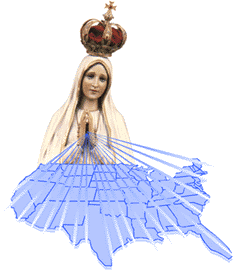T.F.P. meets with problems
by Miguel Martinez TFP ("Tradition Family and Property") considers itself to be engaged in a mortal conflict with the Left. It consequently tends to depict any trouble it may get into, simply as the violent reaction of the "Revolution" against its heroic opponents, a notion which Introvigne has translated into the fiction of the "anti-cult movement".
Actually,
opposition to T.F.P. has come mostly from parents of T.F.P. members, themselves
usually Catholic traditionalists, and from conservative and traditionalist
Catholic quarters.
There are several reasons for this. In the first place, outside of Latin America, TFP generally keeps a low profile or operates through front organizations which the left usually does not understand. Skinhead-scalpers will turn elsewhere when they find a group like TFP whose writings are difficult to read, which is generally unobtrusive, and was founded by a man who sympathized for the British conservatives during the War (so much so that they took a pro-British stance during the Falkland War). TFP always viewed Fascism, with its optimistic cult of the State and the Nation, as a deviant form of "revolutionary socialism". Another reason is that TFP is actually far to the right of virtually every other right-wing organization. Whatever feelings people may actually harbour deep down, I know of no other right-wing organization which publicly holds that the rich are better than the poor. Even the most extreme Catholic traditionalists tend to blame the modern world on "International Freemasonry" or on "the banker Mafia", whereas TFP puts the blame squarely on the rebellious poor, to whom it opposes its self-styled "rightism". The third reason is doctrinal. Catholic traditionalists have problems with the "official" Church because of its supposed doctrinal deviation; but TFP is only interested in fighting agrarian reform, not in doctrine, which is why it was able to accept Vatican II and the reform of the liturgy. After all, the Pope has more battalions than Monsignor Lefèbvre ever had. Also, Plinio's denial of the future role
of priests - and the exclusion in the present of priests from all the more
secret aspects of the group - led Monsignor Castro de Mayer, for decades
Plinio's patron among the Brazilian bishops, to state:
The extent of TFP's doctrinal deviation can be seen from the following document. I apologize to Catholic readers for including it, since it sounds very much like some of the more ribald songs nineteenth-century anticlericals used to sing after having had a drink too many. This "hymn" is however serious: a parody on one of the most revered hymns to the Virgin in the Catholic tradition, this is dedicated to Dona Lucilia, the mother of Plinio Corrêa de Oliveira:
The most extraordinary claim here is also the most obscure, "Mother of the Axiological Principle": this means a principle requiring no previous principle, in other words God himself. This hymn came into public domain when
it was revealed by Prof. Orlando Fedeli, a member of TFP for over 30 years,
who asked Mons. Antonio de Castro Mayer for his opinion on its orthodoxy.
One can see where the roots of Introvigne's dislike for "apostates" lies.
TFP did not deny the allegation; it simply shifted the blame on over-zealous
young followers, and claimed the hymn to be perfectly orthodox ((Carlo
Alberto Agnoli e Paolo Taufer, TFP: la maschera e il volto, Ed.
Adveniat, S.Giustina di Rimini, s.d., p. 17 ss). - shifting the blame onto
the boys is a time-honoured practice in certain kinds of organizations.
It also claimed that use of the hymn had long been discontinued. The current
official version of this issue is given by Roberto de Mattei in his hagiography
of Doctor Plinio (Roberto de Mattei, Il crociato del secolo XX: Plinio
Corrêa de Oliveira, Piemme, Casale Monferrato, 1996, p. 249):
Oddly, this hymn by Brazilian adolescents seems to have spread across the ocean, since it was certainly used in France in the early '80s, and a former AC member recently told me that some TFP affiliates were still using it in Italy in the early '90s. When nothing else works, shocked TFP sympathizers who discover this hymn are told that "things are different in Latin America": this happened to be a favourite stratagem in my group, New Acropolis, which came from Latin America too. If Plinio's mother is the Virgin Lucilia,
her offspring of course must be quite special. Just how special appears
from an extraordinary episode, which can hardly be blamed on over-zealous
adolescents, since it is based on a statement made by Plinio, repeated
in many works on him, and - as usual - proudly narrated in Cristianità.
("In memoriam: Plinio Corrêa de Oliveira", November-December 1995,
p. 6):
More than its political character, it was this highly suspect theological nature of the group which led to its condemnation by the Council of Brazilian bishop
The terms "cult" or "sect", with their double meaning of "deviant religious behaviour compared to an institutional religion" and a "closed totalist group", are certainly ambiguous. But this condemnation of TFP reveals why the organization was certainly considered by some to be a "cult" in the first sense of the word; and why therefore this organization took a special interest in the issue of "cults" in 1985, that is exactly when Introvigne too started involving himself in this matter. Former TFP members have written that Plinio
was well aware of this association. Referring to cult accusations, he used
to tell them:
   |
